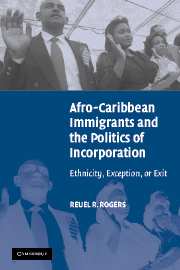Book contents
- Frontmatter
- Contents
- List of Tables
- List of Illustrations
- Acknowledgments
- Strangers at the Gate: Immigrant Political Incorporation in a New Century
- 1 Beyond Black and White: Theories of Political Incorporation
- 2 “Good” Blacks and “Bad” Blacks?
- 3 Letting Sleeping Giants Lie
- 4 Afro-Caribbeans and African Americans: Racially Bound or Ethnically Splintered?
- 5 Afro-Caribbean Sojourners: Home Country Ties and the Hope of Return
- 6 Black Like Who? Afro-Caribbean Immigrants, African Americans, and the Politics of Group Identity
- 7 Black Ethnic Options
- Conclusion: Reconsidering Political Incorporation and Race
- Appendix A Methodology
- Appendix B Interview Schedules
- Bibliography
- Index
4 - Afro-Caribbeans and African Americans: Racially Bound or Ethnically Splintered?
Published online by Cambridge University Press: 07 November 2009
- Frontmatter
- Contents
- List of Tables
- List of Illustrations
- Acknowledgments
- Strangers at the Gate: Immigrant Political Incorporation in a New Century
- 1 Beyond Black and White: Theories of Political Incorporation
- 2 “Good” Blacks and “Bad” Blacks?
- 3 Letting Sleeping Giants Lie
- 4 Afro-Caribbeans and African Americans: Racially Bound or Ethnically Splintered?
- 5 Afro-Caribbean Sojourners: Home Country Ties and the Hope of Return
- 6 Black Like Who? Afro-Caribbean Immigrants, African Americans, and the Politics of Group Identity
- 7 Black Ethnic Options
- Conclusion: Reconsidering Political Incorporation and Race
- Appendix A Methodology
- Appendix B Interview Schedules
- Bibliography
- Index
Summary
Although the Democratic Party's neglect of Afro-Caribbean immigrants may fly in the face of standard pluralist predictions, it would hardly surprise most exponents of the minority group perspective. Scholars who subscribe to this view believe exclusion from dominant political parties – and most mainstream institutions, for that matter – is an all too common shared reality for racial minority groups in the United States. According to this line of thinking, foreign-born minorities, no less than their native-born counterparts, are bound to encounter barriers to their participation in the many key arenas of American life. African Americans are, of course, the paradigmatic group in this regard. The history of their exclusion from the major parties and other mainstream American institutions is well known (e.g., Frymer 1999).
Yet the literature on urban political incorporation is replete with examples of African Americans' mobilizing from independent bases outside conventional party channels to demand racial inclusion, systemic reform, and sometimes a radical redistribution of resources – in cities such as Chicago and Atlanta (e.g., Grimshaw 1992; Pinderhughes 1987; Kleppner 1985; Carmichael and Hamilton 1967). Not surprisingly, then, minority group scholars would expect Afro-Caribbean immigrants to follow the example of their native-born counterparts and mount an insurgent movement for inclusion, in light of the unwillingness of the Democratic Party to draw them into the political process. Indeed, exponents of the minority group view arguably would predict a race-based alliance between Afro-Caribbean and African-American New Yorkers to press for greater black political incorporation.
- Type
- Chapter
- Information
- Afro-Caribbean Immigrants and the Politics of IncorporationEthnicity, Exception, or Exit, pp. 111 - 144Publisher: Cambridge University PressPrint publication year: 2006



